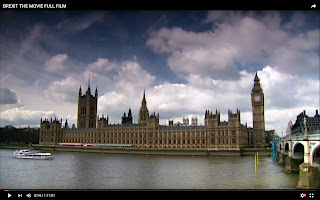 The referendum campaign is hotting up as the June 23 date looms large and so far probably the only issue that many people agree upon, is it could be 'the biggest decision' voters will be asked to take. Well, this year anyway.
The referendum campaign is hotting up as the June 23 date looms large and so far probably the only issue that many people agree upon, is it could be 'the biggest decision' voters will be asked to take. Well, this year anyway.But is that really true? As with much of the campaign so far neither side can say what will actually happen should the British voters opt to leave the EU, because so far nobody has. Left the EU that is.
The campaign to stay in the EU is led by the prime minister, along with most of the opposition parties, big business, big trade unions, an impressive line up of 'important' or 'famous' people and beneficiaries of public funding in general. It is supported by the unelected EU bureaucrats, the EU presidents - yes there are several of them - the President of America, the leaders of the G7 countries and backed by plenty of EU funding.
The 'Leave' campaign - the official one that gets some government cash to spend on the campaign - appears to be led by former London Mayor and Member of Parliament, Boris Johnson who is a likely challenger for David Cameron's day job as Prime Minister and leader of the Conservative Party when this is all over. So the outcome might be winner takes all. The other main advocates of leaving the EU are the UK Independence Party - UKIP - whose main purpose, or raison d'être as our French friends might say, is to quit the EU. UKIP paradoxically are the biggest group of UK MPs in the European Parliament. Or 'mock' parliament as it has no powers to sponsor, promote or reject laws. UKIP head up some rag tag coalition of groups and individuals who just don't want anything to do with Europe.
Helpfully, well may be, into this arena The Electoral Commission has issued a small leaflet explaining the whole election process and offering a summary of the 'Vote Remain' and 'Vote Leave' key points.
The 'lets stay in side 'stands accused of what the British press call 'Project Fear'- in short bombarding the electorate with a whole catalogue of disasters that will be visited on Britain like some biblical plague of frogs if they dare to vote to leave. The three key issues for them are:
- Stronger - a larger economy, stronger leadership on the world stage and getting more out than we put in.
- Safer - by fighting cross border crime, tackling terrorism and climate change.
- Better off - more jobs with 3 million linked to EU trade, lower prices for families and more trade for business.
The 'lets leave and govern ourselves' side's arguments are summed up as:-
- EU law controls UK migration policy - more than a quarter of a million people came into the UK in the last 12 months, enough to fill a city the size of Newcastle.
- The EU is growing - 9 members when we joined and its 28 now with 5 more to come.
- We pay £350 million a week to the EU budget - thats a lot of money!
The headline issues of the stay side - Stronger, Safer, Better Off - are in themselves hardly contentious aspirations, but associated with the EU need some justification as to the relevance of the EU in such achievements. Clearly the British economy has been stronger in the past and nothing to do with the EU and 'we get more out than we put in is demonstrably false' - even the EU acknowledges Britain is one of the net contributors. Safer links crime across borders, tackling terrorism and climate change. Cross border crime is undoubtably more of an issue due to the EU's obsession with free movement across borders. What role does the EU have in tackling terrorism that is not the role of national governments already and genuine international co-operation such as Interpol? And 'climate change' - even its believers don't claim safety as the main issue. It is worth adding that it is the American supported NATO that has kept the peace in Europe since the end of World War 2. The 3 million jobs is based on a 15 year old review and prices have gone up in the EU - don't believe it, then check against American prices.
Now view Europe - the movie




